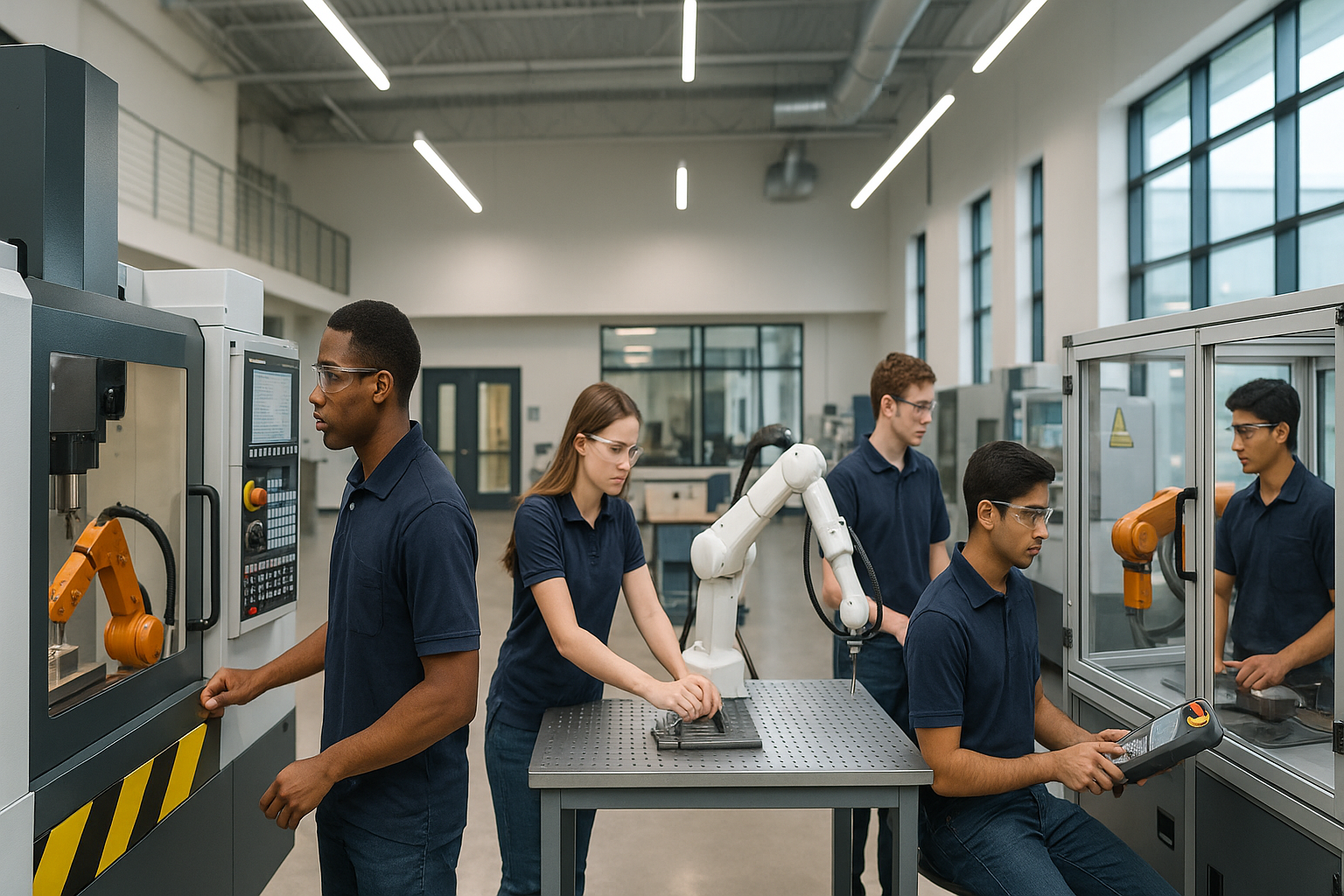States Are Building Trade Schools Like Crazy: Tennessee Drops $60M, Florida Goes All In
A quick read for students exploring skilled trades in the U.S.
TL;DR: Tennessee just opened a $60 million, 120,000-square-foot technical college campus—part of a $1 billion statewide investment in trade education. Florida’s building a 52,000 sq ft vocational school with construction industry partners. Translation: states are betting big on skilled trades, and there’s about to be a lot more classroom and shop space for students like you.
U.S. market focus; public statements as of October 2025.
Why states are suddenly pouring money into trade schools
Here’s what’s happening: Manufacturers are setting up massive facilities across the U.S. — automotive plants, EV battery factories, data centers — and they can’t find enough qualified workers. Meanwhile, community colleges have waiting lists for welding, HVAC, and industrial maintenance programs.
So state governments looked at each other and said, “Maybe we should build more schools?”
Tennessee and Florida didn’t just build more classrooms — they went all-out, creating cutting-edge facilities designed around what employers actually need. Think robotics labs, high-bay manufacturing simulators, and EV production training spaces.
This isn’t charity. It’s economic development. States want the jobs, companies want workers, and students need training. Everyone wins if the pipeline flows.
Tennessee: The $1 billion bet on technical education
TCAT at Stanton: 120,000 sq ft of advanced manufacturing training
On June 14, 2024, Tennessee opened the Tennessee College of Applied Technology (TCAT) at Stanton, a $60 million facility that’s basically the flagship of the state’s technical education renaissance.
The numbers alone are impressive:
- 120,000 square feet of training space
- $60 million construction cost
- Completed three weeks ahead of schedule (when does that ever happen?)
- Part of a $1 billion statewide plan to expand and modernize all 23 technical colleges
Governor Bill Lee showed up for the ribbon-cutting, which tells you how serious the state is about this. The project was first announced in 2021 specifically to train workers for the West Tennessee Megasite — a massive industrial park where manufacturers are building factories.
What you can actually study there
TCAT Stanton isn’t teaching outdated skills. The programs are laser-focused on advanced manufacturing:
- Automotive Technology (traditional and modern systems)
- Electric Vehicle Production Technology (the future is electric, whether we like it or not)
- Industrial Maintenance Technology with Integrated Automation (robots need babysitters)
- Tool and Die Machining (precision manufacturing)
- Welding Technology (always in demand)
The campus also partners with Dyersburg State Community College, which offers general education courses on-site. That means you can knock out some academic credits while you’re learning to weld or program automated systems — potentially stacking credentials toward an associate degree.
What the facilities actually look like
This isn’t your grandpa’s shop class. TCAT Stanton includes:
- 12 stand-alone classrooms (for theory and technical instruction)
- 6 classrooms linked to high-bay technology labs (learn it, then do it)
- 4 high-bay labs that replicate real industrial environments
- Large workforce training simulation space (practice before you touch $500k equipment)
- Dedicated veterans’ services area (military-friendly campus)
The high-bay labs can house robotics, integrated automation systems, and other advanced manufacturing equipment. Translation: you’re not just reading about how factories work — you’re working in a simulated factory.
The bigger Tennessee picture: $1 billion and no more waiting lists
TCAT Chancellor Dr. Flora W. Tydings called the $1 billion investment “the largest single capital investment in Tennessee higher education history.” The goal? Serve more than 140,000 students across the state’s 23 colleges of applied technology and 13 community colleges.
More importantly: eliminate waiting lists. Right now, if you want to enroll in a popular program like welding or HVAC, you might wait months or even a full year for a spot to open up. Tennessee is building enough capacity that anyone who wants technical training can get in.
That’s a huge deal if you’re trying to switch careers or start one quickly.
Source: Tennessee Board of Regents → TBR.edu → “TCAT at Stanton opens as Tennessee’s newest technical college campus” (June 14, 2024) — https://tbr.edu
Florida: Public schools + construction companies = new vocational campus
Plant City Technical School: 52,000 sq ft, opening fall 2025
In November 2024, Hillsborough County Public Schools broke ground on a 52,000-square-foot vocational school in Plant City, Florida. The facility is slated to open for the fall 2025 semester and will serve about 900 students in its first year.
What makes this interesting is the partnership: the school district teamed up with Skanska, a global construction company, to design and build the facility. Skanska’s vice president, Daniel Abou-Jaoude, said the school is “strategically positioned to meet the region’s need for skilled trades workers.” Translation: the construction industry helped design a school to train the workers the construction industry desperately needs.
Enlightened self-interest at work.
Programs designed to get you working in one year
Plant City is all about speed to employment. The school offers:
- Welding (always a solid bet)
- Industrial Electricity (factories need electricians)
- HVAC Systems (Florida is hot; HVAC techs print money)
- Other trades (curriculum still being finalized with industry input)
Most programs are designed to be completed in about one year, so you can start earning a paycheck ASAP. Some shorter certifications — like forklift operation — will also be available for students who need immediate credentials.
Dual enrollment: high schoolers can get a head start
If you’re still in high school, you can enroll at Plant City through dual enrollment and graduate with both your diploma and an industry-recognized certification. That’s a huge advantage — you’re 18 with a skilled trade cert while your friends are applying to four-year colleges.
Adults can also use the programs to upskill or switch careers. Warren Brooks, the district’s executive director of career, technical and adult education, emphasized that the curricula were developed in collaboration with local employers to ensure graduates actually find jobs.
Brooks also noted something important: many students who struggle in traditional academic environments thrive when they see the real-world applications of science and math in trades like electrical work. Sometimes you just need to know why you’re learning algebra — and “because you need it to calculate voltage drop” is a pretty good answer.
What’s the school’s name? TBD.
As of summer 2025, the school didn’t have an official name yet. Officials solicited community suggestions and planned a naming process for summer 2025. So if you’re in the area, maybe you can vote. “Plant City Technical College” is boring. Aim higher.
Source: Ari Angelo → WUSF → “A new technical school is set to open in Plant City next year” (Nov. 8, 2024) — https://wusf.org
What these investments actually mean for you
1. More seats = shorter wait times
If you’ve ever tried to enroll in a popular trade program, you know the frustration of being told “the class is full, try again next semester.” Tennessee’s $1 billion plan specifically targets waiting lists, and Florida’s new campus adds 900 seats. More capacity = less waiting around.
2. Better facilities = better training
Modern high-bay labs, robotics equipment, EV production tech — these aren’t nice-to-haves. They’re what employers expect you to know. Training on outdated equipment is like learning to code in COBOL. Sure, it’s a skill, but it’s not the skill that gets you hired in 2025.
3. Industry partnerships = job placement
When construction companies like Skanska help design the school, and manufacturers help design the curriculum, there’s a direct pipeline from classroom to job site. Tennessee’s TCAT Stanton was literally built to supply workers to the West Tennessee Megasite. Florida’s Plant City school partnered with local employers from day one. That’s not a coincidence — that’s intentional workforce development.
4. Dual enrollment = stacking credentials fast
If you’re in high school, dual enrollment at these new facilities means you can graduate with a certification (or even an associate degree) at 18. That’s a massive head start. While your peers are taking on student loans for a four-year degree, you’re already working and earning.
5. States are committed for the long haul
A $1 billion investment isn’t a one-year pilot program. Tennessee is rebuilding its entire technical college system. Florida is expanding vocational schools across multiple counties. These aren’t experiments — they’re long-term infrastructure projects. That signals stability and continued support.
How to take advantage of these new facilities
If you’re in Tennessee:
- Check out TCAT campuses: Tennessee has 23 TCATs statewide. The Stanton campus is new, but all campuses are part of the $1 billion modernization.
- Explore programs: Automotive, EV tech, industrial maintenance, welding, tool and die machining.
- Look into dual enrollment: If you’re still in high school, ask your guidance counselor about enrolling at a TCAT.
- Financial aid: TCATs are public schools, so you qualify for federal Pell Grants, state aid, and scholarships like DEWALT’s Grow the Trades.
More info: https://tbr.edu
If you’re in Florida:
- Plant City opens fall 2025: If you’re in Hillsborough County, this is your new option for welding, HVAC, industrial electricity.
- Dual enrollment: High school students can start earning college credits and certifications now.
- Adult learners: One-year programs make career transitions realistic even if you’re working full-time.
- Watch for announcements: The school’s name and full program list should be finalized by summer 2025.
More info: Contact Hillsborough County Public Schools career and technical education department.
If you’re anywhere else:
- Check your state’s technical college system: Many states are following Tennessee’s lead with major investments in trade education.
- Ask about new facilities: Even if your state isn’t building $60M campuses, community colleges are expanding programs and upgrading equipment.
- Look for industry partnerships: Schools partnering with local employers often have better job placement rates.
Explore trade programs on TradeColleges.org
Want to see what’s available nationwide? Browse programs by field:
- All Trade Programs (Index): https://tradecolleges.org/programs/page/1
- Electrician / Industrial Electricity: Program examples — https://tradecolleges.org/colleges/owensboro-community-and-technical-college/programs/electrician/ , https://tradecolleges.org/colleges/western-technical-college/programs/electrician/
- Welding: Search programs at https://tradecolleges.org/programs/page/1
- HVAC: School & program examples — https://tradecolleges.org/colleges/northwest-hvacr-training-center/ , https://tradecolleges.org/colleges/hvac-technical-institute/programs/
- Automotive / EV Tech: Career guide: https://tradecolleges.org/blog/trade-programs/automotive-technology-career-opportunities
- Industrial Maintenance: Program example — https://tradecolleges.org/colleges/san-jose-city-college/programs/industrial-mechanics-and-maintenance-technologytechnician/
The bottom line
States are making big, long-term bets on skilled trades education. Tennessee’s $1 billion investment, Florida’s new vocational schools, and similar initiatives across the country signal that policymakers see technical education as critical infrastructure — not a second-tier option.
For students, this means:
- More capacity (shorter or no waiting lists)
- Better facilities (modern equipment, realistic simulations)
- Stronger job pipelines (industry partners = employers who are hiring)
- Faster pathways (one-year programs, dual enrollment, stackable credentials)
If you’ve been thinking about a trade career, now’s the time. The buildings are going up, the equipment is being installed, and the employers are waiting. You just need to show up and do the work.
Sources (public statements & reporting)
- Tennessee Board of Regents → TBR.edu → “TCAT at Stanton opens as Tennessee’s newest technical college campus” (June 14, 2024) — https://tbr.edu
- Ari Angelo → WUSF → “A new technical school is set to open in Plant City next year” (Nov. 8, 2024) — https://wusf.org
- Frank Mannarino → PRNewswire → “To Help Grow the Trades, DEWALT Announces Grant Recipients” (Sept. 20, 2024) — https://prnewswire.com
- Emily Cahn → Stanley Black & Decker → “DEWALT Announces the 2024 DEWALT Trades Scholarship Recipients” (May 30, 2024) — https://stanleyblackanddecker.com
- Kaylin Staub → Supply House Times → “SupplyHouse launches second annual Track to the Trades Scholarship” (July 25, 2025) — https://supplyht.com
- Mike Rowe → MikeRowe.com → “mikeroweWORKS is About to Award $2.4M in Work Ethic Scholarships” (July 10, 2024) — https://mikerowe.com
Note: U.S. focus; links current as of Oct 2, 2025.



